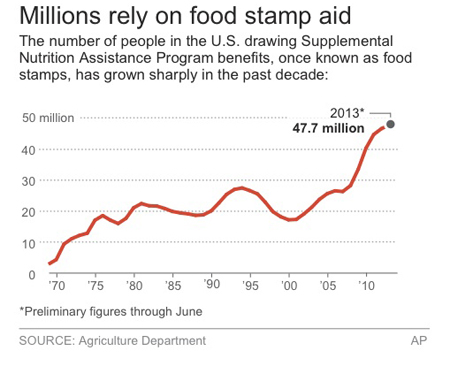
WASHINGTON (AP) — House Republican leaders say food stamps serve too many Americans and the almost $80 billion-a-year program needs to be slimmed down.
This week, the House is expected vote on a bill that would cut almost $4 billion a year from food stamps. The bill, opposed by most every Democrat, would let states put broad new work requirements in place for many recipients and permit drug tests for people who apply. And it would end government waivers that have allowed able-bodied adults who don’t have dependents to receive food stamps indefinitely.
A look at some of the arguments being made by the GOP’s House majority as the chamber prepares to take up the bill:
THE CLAIM: One in 7 Americans is on food stamps, according to a memo to GOP colleagues from House Majority Whip Kevin McCarthy, R-Calif., explaining the reasoning behind the bill.
THE FACTS: True. Around 47.8 million Americans were using food stamps, now known as the Supplemental Nutrition Assistance Program, or SNAP, in June of this year, a little more than 1 in 7. The program’s cost has more than doubled since the Great Recession, going from roughly $38 billion in 2008 to almost $78 billion last year. The 2009 economic stimulus bill increased benefits and loosened some eligibility requirements.
THE CLAIM: “Middle-class families struggling to make ends meet themselves foot the bill for a program that has gone well beyond a safety net for children, seniors and the disabled,” McCarthy’s memo says.
THE FACTS: It depends on how you define “well beyond.” Some 87 percent of SNAP participants live in a household with a child, a senior or a disabled person, according to Agriculture Department data. Around 45 percent of recipients are under age 18 and 9 percent are older than 60. Only about 10 percent of recipients are able-bodied adults under age 50 without dependents.
THE CLAIM: Those able-bodied adults are “the very group that is supposed to be subject to a work requirement, (but) the requirement has been waived in almost every state,” the memo argues.
THE FACTS: True. Starting with enactment of the 1996 welfare law, able-bodied adults were limited to only three months of SNAP benefits in a three-year period unless they were in a work or workfare program for 20 hours or more each week. Those work requirements were waived as part of the 2009 stimulus, and the Agriculture Department later allowed states to continue to extend those waivers if they meet certain economic requirements. All but a few states have met the requirements and are still taking advantage of the waivers.
THE CLAIM: Speaking to constituents over the August congressional recess, many GOP lawmakers focused on restoring the work requirements. Rep. Patrick McHenry of North Carolina, for example, told constituents that GOP plans won’t harm “any individual child” but are aimed at “able-bodied adults who refuse to work.”
THE FACTS: While some may simply refuse to work, other able-bodied adults can’t find jobs. They may be sick or disabled but don’t qualify for disability payments, suffer from undiagnosed mental illness or live in economically depressed areas. Judy Toelle, South Dakota’s SNAP administrator, says that some people on South Dakota Indian reservations are not able to find jobs because there aren’t any. “There is a whole category of individuals who are unemployable for various reasons,” Toelle said.
Cathy Sykes, who heads the SNAP program in Mississippi, agreed. “I think we have some who are taking advantage of the system, and I think we have others who are disabled and don’t meet the criteria,” she said.
THE CLAIM: The McCarthy memo says “newscasts tell stories of young surfers who aren’t working, but cash their food stamps in for lobster.”
THE FACTS: One dude did. But surfers aren’t known to be hitting the lobster shack waving food stamps. Fox News interviewed a California surfer who proudly spoke of not working and using his monthly $200 in food stamps to eat. In response to the report, the Agriculture Department wrote to the state’s Department of Social Services saying it was assessing the surfer’s certification. USDA’s Kevin Concannon said in the letter that the surfer was not a typical recipient, but acknowledged that “such an individual is technically and legally able to access nutrition assistance.”
THE CLAIM: According to House Majority Leader Eric Cantor, the Virginia Republican leading the push for the bill, “No law-abiding beneficiary who meets the income and asset test of the current program and is willing to comply with applicable work requirements will lose their benefits under the bill.”
THE FACTS: The Congressional Budget Office says that if the bill were enacted, as many as 3.8 million people could lose their benefits in 2014. Around 1.7 million of those would be able-bodied adults who would be subject to the restored work requirements after three months. The other 2.1 million would lose benefits because the bill would largely eliminate so-called categorical eligibility, a method used by many states that allows people to automatically qualify for food stamps if they already receive other benefits. Some of those people who qualify that way do not meet current SNAP income and asset tests. Republicans argue that anyone who does qualify for SNAP can just reapply for SNAP directly.
THE CLAIM: The McCarthy memo says “the federal government has embarked on an unprecedented advertising and recruitment effort to expand the number further” of food stamp beneficiaries.
THE FACTS: “Embarked on” is a stretch. The Agriculture Department has long conducted such outreach under both Democratic and Republican administrations, saying that some advertising is necessary to make sure the benefits are being delivered to the right people. The department says its outreach has focused on groups that are eligible under the law, and its message is that food stamps are supposed to be temporary. The department says it discontinued advertising for SNAP last year, but states can still decide to produce ads if they want to.

